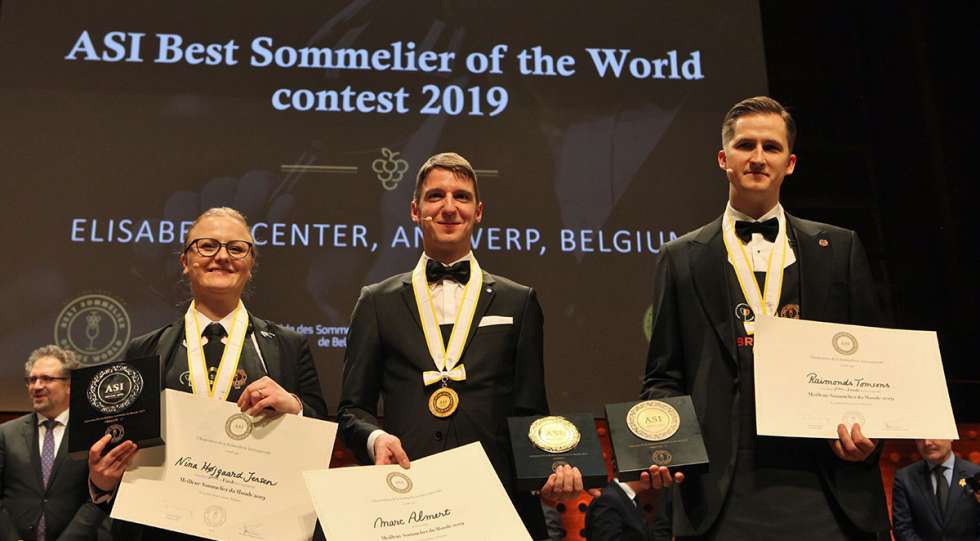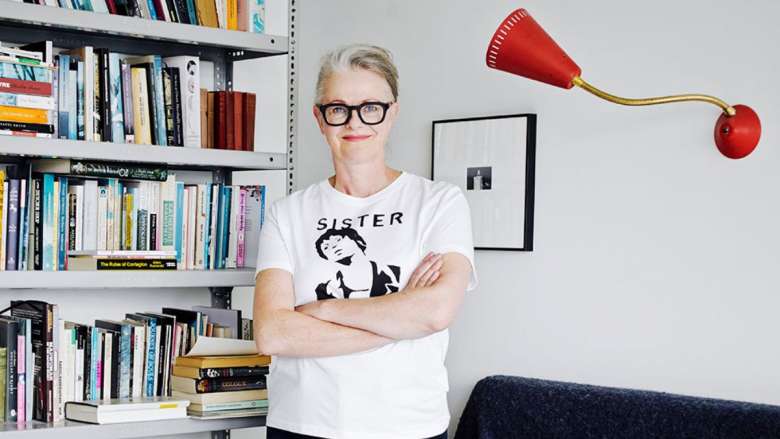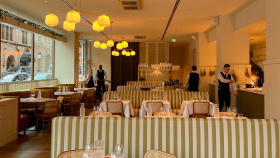How to win a sommelier competition

The world’s top sommeliers will soon be on their way to Paris for the ASI Best Sommelier of the World 2023. A sports psychologist who works with Olympians, and a renowned acting coach, weigh in on how to create a peak performance.
Stage fright has been part of the human condition since the first Neanderthal stood up from the campfire to give an after-dinner speech, only to find his mouth was dry.
Nerves can be a particular problem in sommelier competitions, where sommeliers must somehow go from being hospitality professionals to actors performing in front of an audience.
And the most high-stakes competition of them all, the tri-annual ASI Best Sommelier of the World competition, is about to take place in Paris. Although competitors are top professionals who have spent months preparing, anxiety is likely to affect even the best of them.
One way to deal with it is to use the strategies of other people who have faced these same challenges: athletes and performers.
The ASI Best Sommelier of the World competition explained
Sommelier competitions generally have three parts: a theory paper, a blind tasting, and a service test. Arvid Rosengren, the ASI Best Sommelier of the World 2016, who’s been working on planning the 2023 competition, says the service element is quite short during the first round, as there are around 70 candidates to get through.
In the semi-final, the service portion will be longer. “Maybe 20 minutes or half an hour, with various tasks to string together.”
This is where nerves can be a problem. “The most common thing is someone was too nervous to listen to the instructions or didn’t understand that something happened they were supposed to solve,” says Rosengren. Anxiety also affects the perception of time, which can be disastrous in the final, where doing tasks in the allocated time is critical.
When Dr Mark Aoyagi, Co-Director of Sport & Performance Psychology and Professor in the Graduate School of Professional Psychology at the University of Denver, coaches top athletes, he tells them the best way to deal with anxiety is simply to recognise it. “The effects of anxiety are somatic excitation. So, muscle tension, heart rate increases, things like that. The biggest impact is that anxiety eats up attention and causes our attention to narrow.”
Yet Aoyagi says “anxiety is not the enemy. If we focus our energy on managing our anxiety or trying to calm down, all the energy is spent. It’s not spent on actually performing the task in hand,” he says.
Instead, focus on breathing, and on increasing attention: competitors should remember that they’re more likely to misread the instructions. Aoyagi also says to consider how anxiety has manifested in the past, and plot strategies to deal with it, such as having water close to hand if a dry mouth is a problem. Also to remember that “the fear of the thing happening is much greater than the impact of the actual thing itself happening.”

When the stakes get higher
Of the 12 or so people who make it to the end of the semi-final, all but three will be eliminated ― publicly. The three finalists are then sent out while the room is set up. When they return, there will be an audience, a film crew, spotlights and microphones.
“When it comes to the biggest competition in the world ― the Olympics, say, or the Super Bowl ― it’s going to feel like chaos,” says Aoyagi. “There’s no way to prepare to be your normal self in that. You have to prepare to be able to perform under extreme stress.”
There are two states that champions strive for: flow and clutch. “Flow state is that kind of effortless feeling of you’re just in tune with your performance,” says Aoyagi. While flow state is ideal, it’s not always available on command ― but clutch state, where competitors purposely summon up extra strength, is. The key to creating a clutch state is to pay full attention to each task. “The hallmark of being able to go into a clutch performance state is a clear goal, a clear sense of where you need to go next.”
Paradoxically, it’s hard to engage with a task that’s too easy. So a sommelier who can open a bottle without having to think about it might lose focus. The solution is a training regime that focuses on finding ever better ways to perform the task.
Then there’s the problem of split attention ― how do you remove a crumbling cork with ease, while also focusing on demanding diners? “One of the things we know about dividing your attention is that you can’t,” says Aoyagi. If you’re interrupted, it takes time to get absorbed back into that task.
He advises “chunking” your attention. “It’s like, while I’m taking the order, my attention is going to be fully on the customer.” When opening a bottle, concentrate on that and ignore distractions.
And all of this has to be done with flair and showmanship.

The art of hospitality performance
Miranda Harcourt says a sommelier in a competition is involved in two performances simultaneously. The first is to make the customers believe what’s going on, even if they are actors. The second is to make the audience believe it.
New Zealander Harcourt, an internationally sought-after drama coach whose client list includes Nicole Kidman and Prime Minister Jacinda Ardern, suggests starting with the physical space.
A major difference between working in a restaurant and being on stage is that the sommelier will know the restaurant intimately, from where the bathrooms are, to where everything is in the cellar. But on stage, “they’re in a fake environment.”
Harcourt advises people to go into the competition room and “touch all four walls. Go all the way to the back, put your hands on the wall, and just breathe in the space.” She says it’s “what animals do,” by peeing in their environment ― they’re claiming the space. Harcourt adds that sommeliers “shouldn’t pee in the corners, obviously”. But if possible, make a noise, to feel how it bounces off the walls. “Just take some of the phrases they know they’ll be using, like ‘How can I help you?’”
This advice won’t always work; Rosengren says there’s no chance of doing it for the upcoming competition in Paris. “The rooms we use are locked away for days in advance.”
But it’s worth checking the hotel’s website to see if there is a floor plan, as even a mental walk through the space can be helpful.
Warm up the body
Actors warm up before every performance, to release tension and get their bodies and voices working. Harcourt knows that non-actors find vocal warmups embarrassing, so she recommends Amy Cuddy’s ‘power pose’, which involves standing like Wonder Woman for two minutes, with back straight and hands on hips, while breathing deeply. While there’s some controversy about whether the pose works as claimed, Harcourt says it’s great for performers, because it will stretch the intercostal muscles that lift the rib cage, and relax the throat.
She also recommends lifting the hands up above the head and holding them there for two minutes, to open up the body. “These are the parts of the body that we try to shield when we are fearful,” she says, indicating her chest. “ So the great thing is that you are forcing yourself to reveal the parts of the body that we normally hide, and that allows you to attain a shot of testosterone and adrenaline that gives you a sense of courage.”
When performers relax, the audience relaxes as well. Humans subconsciously mirror one another, so if the person in front of us is tense, we feel tense too. “One of the key precepts I use as an acting coach is what I call ‘reverse the flow’. You want to make your primary relationship your relationship with the other, not yourself,” explains Harcourt. “Sommeliers have reached this point of the competition because they already understand that the most important person is the other,” so being relaxed can help a sommelier tap their professional competence.
One of her quirkier pieces of advice is to buy a really amazing pair of new socks ― splash out on cashmere. Good socks, she says, can bring performers out of their head and into a connection with the stage, because they “can ground themselves, just by thinking ‘wow, these socks feel amazing’.”
She also suggests that competitors create an imaginary audience of their own ― someone who loves them, whether that’s a grandmother or a best friend from school. “Allow that person to be present in your imagination, at the back of the theatre or by the exit. It’s a visualisation tool, but allowing that person to be in the room with you can be really helpful. They’ve got your back.”
When things go wrong
It doesn’t matter how prepared or relaxed someone is, things still go wrong. Both Aoyagi and Harcourt agree that it’s important not to stop and ruminate over the mistake, but to let it go and move on. Harcourt says a mistake if dealt with elegantly, can even enhance a performance. “As Miles Davis said, ‘it’s not the note you play that's the wrong note ― it’s the note you play afterwards that makes it right or wrong’.”
Also remember, says Harcourt, that the audience wants you to succeed. “They’re not watching hoping the sommelier screws up,” she says. “They’re hoping they will see people attaining mastery.”
Finally, one way to improve performance is to help someone else, even if that person is a competitor. “If you go to the Latin root of the word ‘competition’, it actually means to strive together,” says Aoyagi. “The idea of competition isn’t to vanquish your opponent, it’s to try out the best in yourself. This is a chance to test myself with the very best, and being among the best is likely to bring out the best performance in myself.”
This means that the act of participating will make someone a better sommelier, long after the competition is over. Which is a win.
Do like the Pros - search 2500+ wine lists











